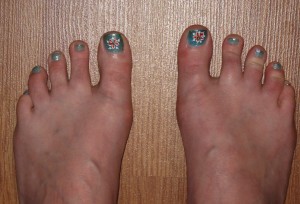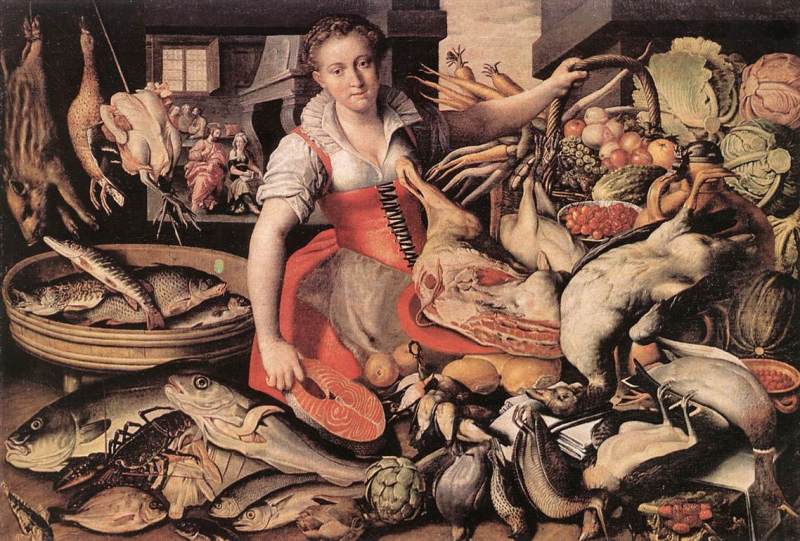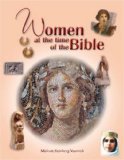I started this blog five years ago (where has the time went?). This was the post that kicked off what become Career Women of the Bible. It was originally posted in August 2006.
Deborah: Words, Women and War', Nathan Moscowitz. )For information about the detailed use of symbols in this intricate painting, go to http://www.nahumhalevi.com/Deborah.html.)
The 12th Century B.C.E. Career Woman
In my imagination I see her under her palm tree, sitting and listening to the people who came to her for justice and peace. Her head nodding as she listens. In my mind’s eye I see her standing, veil blowing in the wind, eyes flashing, as she commands Barak to gather his men and fight Sisera at Yahweh’s command. I also see her resolutely lead Israel’s armies into battle, her chin set, her eyes never wavering from their forward stare. After the battle I see her dancing around the fire, tambourine in hand, singing of the victory in what would become one of the oldest songs recorded in the Hebrew Scriptures. But I also see her in her home, feeding her family, singing stories to her children, going to bed with her husband. Deborah: the first career woman mentioned in the Bible. She is judge, prophet, military leader, and worship leader. But she is also wife, mother, sister, and daughter. It’s no wonder that those who advocate that the “bibilical” place for women is in the home and not the workforce, skip right over Deborah and her story.
During the time of the Judges, Deborah arose as a judge and prophet to lead the people of Israel against an enemy that had cruelly oppressed them for 20 years: King Jabin of Canaan and his general Sisera. Judges 5 is one of the oldest texts of the Bible believed to have been composed as early as the late twelfth century B.C.E. It predates Judges 4 by several centuries. It is Deborah’s song of victory over the forces of Jabin and Sisera, which climaxed in Sisera’s death.
In “Awake! Awake! Utter a Song!” Susan Ackerman shows how Hebrew parallelism is used to show that Deborah and Yahweh work together to win this victory. Verses 1-2 set the tone, ”the people are waiting for Yahweh, they are ready to obey what he says. Deborah calls to the kings and princes to listen to her song for Yahweh has spoken to her. In verses 3-4 Deborah sings of Yahweh’s coming. Yahweh comes from Seir and Edom; from the place where God met Israel at Sinai and made a covenant with them. God is shown as marching north to fight for and defend the people. It is a cosmic event: the earth trembles, the heavens and clouds pour water, the mountains quake when Yahweh comes.
Verses 6-7 then show us what is happening on earth: people cannot travel safely and caravans stopped until Deborah arose as “a mother in Israel,” then the people, even peasants, prospered on the plunder that was taken. This poetic feature shows that this is a holy war–God is coming to fight for his people, and it doesn’t take place on the cosmic level alone–it takes place on the earth to deliver his people. The song also shows that Deborah is Yahweh’s counterpart on earth; she is the one God is speaking through and working through to accomplish God’s purposes on earth.
A Mother in Israel
In verse 7 Deborah is referred to as “a mother in Israel.” Judges 5 does not mention Deborah being married, so it is unlikely we are to take this phrase to literally mean that Deborah had children. The only other place “mother in Israel” is used is 2 Samuel 20:19 to describe the city of Abel of Beth-maacah where Sheba hides after he has instigated a rebellion against King David. When Joab besieges the city a wise woman appears at the wall wanting to know why he is attacking a city that is “a mother in Israel.” Abel is a city that is known for its wisdom in settling matters between conflicting parties. In the past it had been said, “Let them inquire at Abel” (2 Sam. 20:18). Abel was renown for its ability to resolve conflicts. It is a peaceful city, faithful in Israel, which could be a reference to its support of David. The wise woman also calls Abel “the heritage of the Lord” (v. 22). Earlier in 1 Samuel when the mother of Tekoa pleads her case to David she calls her son “the heritage of the Lord” (14:16). The heritage of Yahweh is something that Yahweh has given to his people whether it be children or land, and it is viewed as worth fighting for. “A mother in Israel” is a city that is renown for its wisdom and negotiating skills. It is able to bring about resolutions that protect the heritage of Yahweh.
By extension the wise woman herself is “a mother in Israel.” She shows all of the characteristics of her city: wisdom, negotiating skills, and she is a leader. She wants to protect her city, which is the heritage of Yahweh, and she will have a man killed in order to secure the well-being of her city. This is seen in the fact that Joab speaks to her and doesn’t demand to see someone else. This woman is the elder, and in all likelihood, the military commander of Abel, and that is why Joab negotiates with her: she is his equal.
For Judges 5 to call Deborah “a mother in Israel” is to show that she was known for her wisdom and ability to negotiate peace. It also shows her passionate commitment to bring peace to Israel and well-being to the heritage of Yahweh. She will insure that her people have peace and can prosper, and so she is willing to go to war with Jabin and Sisera at the command of Yahweh to accomplish this goal. She is “the perfect human counterpart of Yahweh, who as ‘the God of Israel’ likewise displays a passionate commitment to the Israelite community” (Ackerman, 43). In the past Yahweh has fought for his people and delivered them out of slavery and oppression, and Deborah boldly announces that he is about to act to free Israel again, and Deborah will obey all he commands of her to see his will done.
Military Leader
The next place we see the cosmic/earth and divine/human intersection is in verse 12: “Awake, awake, Deborah! Awake, awake, utter a song!” Normally the cry to “awake” is cried out by the people to God. They are calling for him to awake and come to their aid. This pattern is seen in both the Psalms and the Prophets. Here we see that it is Deborah who is called to “awake.” This call can come to Deborah because she is Yahweh’s human representative on earth.
In Judges 5 Deborah’s marital status is never mentioned. She is also clearly the military leader with Barak as her second-in-command. This is seen in the following ways: first her name is mentioned more often. Second Barak’s name never appears independent of Deborah’s, and her name is always first. The text also says that the oppression happening in Israel did not stop until Deborah arose in Israel; Barak is not mentioned. The verb arose also implies that it was Deborah who arose to lead Israel’s troops against Sisera and his army.
This changes in Judges 4. Chapter 4 is part of the Deuteronomistic history, which was written and complied during Josiah’s reign in the seventh century B.C.E. Deborah is now identified as a prophet and judge. She is the only female judge in the Hebrew Scriptures, and one of the few named female prophets (Miriam, Huldah, and Noadiah are the other three). She is also married: she is the wife of Lappidoth.
Her role as military leader has been considerably minimized. Yahweh’s role in the battle and the defeat is also curtailed. In chapter 5 Yahweh marched north to Israel causing cosmic upheavel in order to free his people. The only mention of Yahweh’s participation in chapter 4 is in verse 15 where Yahweh throws Sisera’s troops into a panic so that Barak and his men can come and win. Barak now leads the troops although he would not go into battle unless Deborah accompanied him. His reticence to believe that Yahweh was speaking through Deborah would cost him the glory of killing Sisera himself: that honor would go to a woman.
During the premonarchic period before the monarchy and the cult were institutionalized in Jerusalem, a woman could be portrayed as a military leader leading troops into battle to execute Yahweh’s holy war on earth. Due to the mythic nature of the poem, Israel could look beyond gendered roles for women to accept a female military leader. This has changed in the seventh century. Both the monarchy and the temple cult are set in place and acceptable gender roles are established. A female military leader is unacceptable. Therefore Deborah fades into the background and Barak takes the lead. Barak also takes the glory in the rest of the canon (1 Samuel 12:11; Hebrews 11:32). In the lists of judges who are commended, Barak is always mentioned; Deborah is forgotten.
There have also been efforts to insure that Deborah is portrayed as a ‘good, little wife.” This is seen in the tag that she is the wife of Lappidoth. This is also seen in commentators who have tried to marry her off to Barak to explain why they go into battle together. The text does not support a marriage between the two. And Lappidoth does not seem to play a part in Deborah’s calling as a leader. According to the text he didn’t even have anything to say about his wife going off to war. He could have been one of the warriors who went into battle, but apparently he supported his wife’s ministry, and had no trouble with Deborah being a judge over Israel and a prophet.
Deborah, wife of Lappidoth, mother not only to her own children, but to Isreal; prophet, judge, and leader, shows us that women juggling their callings as wife, mother, and leader have existed from the beginning. She is also shows us that family and career can be juggled successfully.
Sources
Susan Ackerman, Warrior, Dancer, Seductress, Queen: Women in Judges and Biblical Israel (New York: Doubleday, 1998), “Awake! Awake! Utter a Song!” 27-88.
Shawna Renee Bound, Your Daughters Shall Prophesy: A Biblical Theology of Single Women in Ministry, unpublished thesis, (© by Shawna Renee Bound 2002), “Judge and Prophets,” 23-34.
E. John Hamlin, Judges: At Risk in the Promised Land (Grand Rapids, MI: William B. Eerdmans Publishing Co., 1990).
The IVP Women’s Bible Commentary (Downer’s Grove, IL: InterVarsity Press, 2002), “Judges,” 133-5.
All biblical quotations are taken from the Revised Standard Version unless otherwise noted.
 Kathryn writes about vacations and staycations:
Kathryn writes about vacations and staycations:













